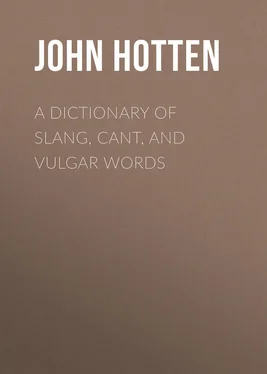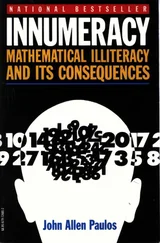John Hotten - A Dictionary of Slang, Cant, and Vulgar Words
Здесь есть возможность читать онлайн «John Hotten - A Dictionary of Slang, Cant, and Vulgar Words» — ознакомительный отрывок электронной книги совершенно бесплатно, а после прочтения отрывка купить полную версию. В некоторых случаях можно слушать аудио, скачать через торрент в формате fb2 и присутствует краткое содержание. ISBN: , Жанр: foreign_antique, foreign_prose, на английском языке. Описание произведения, (предисловие) а так же отзывы посетителей доступны на портале библиотеки ЛибКат.
- Название:A Dictionary of Slang, Cant, and Vulgar Words
- Автор:
- Жанр:
- Год:неизвестен
- ISBN:http://www.gutenberg.org/ebooks/47018
- Рейтинг книги:3 / 5. Голосов: 1
-
Избранное:Добавить в избранное
- Отзывы:
-
Ваша оценка:
- 60
- 1
- 2
- 3
- 4
- 5
A Dictionary of Slang, Cant, and Vulgar Words: краткое содержание, описание и аннотация
Предлагаем к чтению аннотацию, описание, краткое содержание или предисловие (зависит от того, что написал сам автор книги «A Dictionary of Slang, Cant, and Vulgar Words»). Если вы не нашли необходимую информацию о книге — напишите в комментариях, мы постараемся отыскать её.
A Dictionary of Slang, Cant, and Vulgar Words — читать онлайн ознакомительный отрывок
Ниже представлен текст книги, разбитый по страницам. Система сохранения места последней прочитанной страницы, позволяет с удобством читать онлайн бесплатно книгу «A Dictionary of Slang, Cant, and Vulgar Words», без необходимости каждый раз заново искать на чём Вы остановились. Поставьте закладку, и сможете в любой момент перейти на страницу, на которой закончили чтение.
Интервал:
Закладка:
Although in the Introduction I have divided cant from slang, and treated the subjects separately, yet in the Dictionary I have only, in a few instances, pointed out which are slang, or which are cant terms. The task would have been a difficult one. Many words which were once cant are slang now. The words PRIG and COVE are instances in point. Once cant and secret terms, they are now only street vulgarisms.
The etymologies attempted are only given as contributions to the subject, and the derivation of no vulgar term is guaranteed. The origin of many street words will, perhaps, never be discovered, having commenced with a knot of illiterate persons, and spread amongst a public that cared not a fig for the history of the word, so long as it came to their tongues to give a vulgar piquancy to a joke, or relish to an exceedingly familiar conversation. The references and authorities given in italics frequently show only the direction or probable source of the etymology. The author, to avoid tedious verbiage, was obliged, in so small a work, to be curt in his notes and suggestions.
He has to explain also that a few words will, probably, be noticed in the Slang and Cant Dictionary that are questionable as coming under either of those designations. These have been admitted because they were originally either vulgar terms, or the compiler had something novel to say concerning them. The makers of our large dictionaries have been exceedingly crotchety in their choice of what they considered respectable words. It is amusing to know that Richardson used the word HUMBUG to explain the sense of other words, but omitted it in the alphabetical arrangement as not sufficiently respectable and ancient. The word SLANG, too, he served in the same way.
Filthy and obscene words have been carefully excluded, although street-talk, unlicensed and unwritten, abounds in these.
“Immodest words admit of no defence,
For want of decency is want of sense.”
It appears from the calculations of philologists, that there are 38,000 words in the English language, including derivations. I believe I have, for the first time, in consecutive order, added at least 3,000 words to the previous stock, – vulgar and often very objectionable, but still terms in every-day use, and employed by thousands. It is not generally known, that the polite Lord Chesterfield once desired Dr. Johnson to compile a Slang Dictionary; indeed, it was Chesterfield, some say, who first used the word HUMBUG. Words, like peculiar styles of dress, get into public favour, and come and go in fashion. When great favourites and universal they truly become household words, although generally considered slang, when their origin or antecedents are inquired into.
A few errors of the press, I am sorry to say, may be noticed; but, considering the novelty of the subject, and the fact that no fixed orthography of vulgar speech exists, it will, I hope, be deemed a not uninteresting essay on a new and very singular branch of human inquiry; for, as Mayhew remarks, “the whole subject of cant and slang is, to the philologist, replete with interest of the most profound character.”
The compiler will be much obliged by the receipt, through Mr. Camden Hotten, the publisher, of any cant, slang, or vulgar words not mentioned in the dictionary. The probable origin, or etymology, of any fashionable or unfashionable vulgarism, will also be received by him with thanks.
Piccadilly, June 30th, 1859.
THE HISTORY OF CANT, OR, THE SECRET LANGUAGE OF VAGABONDS
Cant and Slang are universal and world-wide.
Nearly every nation on the face of the globe, polite and barbarous, may be divided into two portions, the stationary and the wandering, the civilised and the uncivilised, the respectable and the scoundrel, – those who have fixed abodes and avail themselves of the refinements of civilisation, and those who go from place to place picking up a precarious livelihood by petty sales, begging, or theft. This peculiarity is to be observed amongst the heathen tribes of the southern hemisphere, as well as the oldest and most refined countries of Europe. As Mayhew very pertinently remarks, “it would appear, that not only are all races divisible into wanderers and settlers, but that each civilised or settled tribe has generally some wandering horde intermingled with, and in a measure preying upon it.” In South Africa, the naked and miserable Hottentots are pestered by the still more abject Sonquas ; and it may be some satisfaction for us to know that our old enemies at the Cape, the Kafirs, are troubled with a tribe of rascals called Fingoes , – the former term, we are informed by travellers, signifying beggars, and the latter wanderers and outcasts. In South America, and among the islands of the Pacific, matters are pretty much the same. Sleek and fat rascals, with not much inclination towards honesty, fatten, or rather fasten, like body insects, upon other rascals, who would be equally sleek and fat but for their vagabond dependents. Luckily for respectable persons, however, vagabonds, both at home and abroad, show certain outward peculiarities which distinguish them from the great mass of lawful people off whom they feed and fatten. Personal observation, and a little research into books, enable me to mark these external traits. The wandering races are remarkable for the development of the bones of the face, as the jaws, cheek-bones, &c., high crowned, stubborn-shaped heads, quick restless eyes, 1and hands nervously itching to be doing; 2for their love of gambling, – staking their very existence upon a single cast; for sensuality of all kinds; and for their use of a CANT language with which to conceal their designs and plunderings .
The secret jargon, or rude speech, of the vagabonds who hang upon the Hottentots is termed cuze-cat . In Finland, the fellows who steal seal skins, pick the pockets of bear-skin overcoats, and talk Cant, are termed Lappes. In France, the secret language of highwaymen, housebreakers, and pickpockets is named Argot . The brigands and more romantic rascals of Spain, term their private tongue Germania , or Robbers’ Language. Rothwalsch , or Red Italian, is synonymous with Cant and thieves’ talk in Germany. The vulgar dialect of Malta, and the Scala towns of the Levant – imported into this country and incorporated with English cant – is known as the Lingua Franca , or bastard Italian. And the crowds of lazy beggars that infest the streets of Naples and Rome, and the brigands that Albert Smith used to describe near Pompeii – stopping a railway train, and deliberately rifling the pockets and baggage of the passengers – their secret language is termed Gergo . In England, as we all know, it is called Cant – often improperly Slang .
Most nations, then, may boast, or rather lament, a vulgar tongue, formed principally from the national language, the hereditary property of thieves, tramps, and beggars, – the pests of civilised communities. The formation of these secret tongues vary, of course, with the circumstances surrounding the speakers. A writer in Notes and Queries , 3has well remarked, that “the investigation of the origin and principles of Cant and Slang language opens a curious field of enquiry, replete with considerable interest to the philologist and the philosopher. It affords a remarkable instance of lingual contrivance, which, without the introduction of much arbitrary matter, has developed a system of communicating ideas, having all the advantages of a foreign language.”
An inquiry into the etymology of foreign vulgar secret tongues, and their analogy with that spoken in England, would be curious and interesting in the extreme, but neither present space nor personal acquirements permit of the task, and therefore the writer confines himself to a short account of the origin of English Cant.
Читать дальшеИнтервал:
Закладка:
Похожие книги на «A Dictionary of Slang, Cant, and Vulgar Words»
Представляем Вашему вниманию похожие книги на «A Dictionary of Slang, Cant, and Vulgar Words» списком для выбора. Мы отобрали схожую по названию и смыслу литературу в надежде предоставить читателям больше вариантов отыскать новые, интересные, ещё непрочитанные произведения.
Обсуждение, отзывы о книге «A Dictionary of Slang, Cant, and Vulgar Words» и просто собственные мнения читателей. Оставьте ваши комментарии, напишите, что Вы думаете о произведении, его смысле или главных героях. Укажите что конкретно понравилось, а что нет, и почему Вы так считаете.












